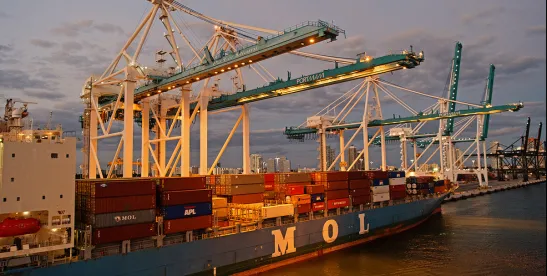The U.S. Federal Maritime Commission (“FMC”) announced on May 21, 2025 that it is initiating a non-adjudicatory investigation into whether the: 1) vessel flagging laws, regulations, and/or practices of certain foreign governments, including the so-called flags of convenience (“FOC” or “open registries”), or 2) competitive methods employed by owners, operators, agents, or masters of foreign-flag vessels, are creating unfavorable shipping conditions in the foreign trade of the United States (the “Notice”).
The investigation includes a 90-day public comment period, which ends on August 20, 2025.
FMC’s “Section 19” Trade Authority
Section 19 of the Merchant Marine Act of 1920, 46 U.S.C. § 42101 et seq., authorizes the FMC to evaluate conditions that affect shipping in the U.S. foreign trade and to issue regulations or take action to address such conditions. Potential remedies include port fees up to one million dollars, limits on voyages to and from U.S. ports or the amount or type of cargo carried, and other trade restrictions.
The FMC exercised this authority frequently in the 1980s and 90s (before the sell-off of the major U.S. liner operators to foreign buyers) to force market-opening concessions and eliminate discriminatory fees and trade barriers that impeded U.S. shipping companies’ competitiveness overseas. However, these powers have been left nearly dormant for the past two decades.
The current investigation does not target particular flag States or propose any remedial measures; rather, it is a non-adjudicatory investigation pursuant to 46 C.F.R. Part 502, Subpart R, which allows the FMC to request information, conduct hearings, issue subpoenas, conduct depositions, and issue reports, at its discretion.
Summary of Investigation
This investigation breaks new ground for the FMC, which traditionally has not had any role concerning vessel registries, marine safety, or the International Maritime Organization (“IMO”) conventions, which set the global framework for vessel regulation. In the Notice, the FMC expressed concern about the conditions created by the wide and uneven range of foreign vessel flagging laws, regulations, and practices. While the Notice indicated that many nations take “great care in creating standards for vessels flagged by their registries,” it also observed that other countries have engaged in a global “race to the bottom” by lowering standards and easing compliance requirements to gain potential competitive edge.
The Notice asserted that FOCs “operate under lax regulatory oversight, leading to lower safety, environmental, and labor standards . . . and FOC vessels exploit lower operational costs through reduced taxes, cheaper labor, and irregular maintenance or safety measures.” But the FMC failed to recognize the quality chasm between industry-leading U.S.-managed international open registries, such as the Marshall Islands and Liberia, versus thinly staffed or sham registries serving non-compliant shadow fleet ships.
The FMC’s Notice discussed other unfavorable flagging practices, including “flag-hopping” or using false flags to avoid regulatory oversight; using fraudulent ship registrations without the knowledge or approval of the relevant maritime administration; and operating in the “shadow fleet,” i.e., outside the regular or official frameworks and often engaging in illegal or illicit activities such as smuggling, sanctions evasion, or the transportation of prohibited goods. The Notice recognized IMO’s policy recommendations and resolutions addressing such practices, but asserted that the IMO’s effort has not led to meaningful change or deterrence.
The FMC did not single-out any particular open registry, but it referenced certain recent incidents and inaccurately linked them to certain open registries as a basis for its action (e.g., the Singapore-flag DALI’s allision with the Francis Scott Key Bridge, the Malta-flag APL QINGDAO’s narrowly avoided allision with the Verrazzano Bridge, and the MS MELENIA, currently under the Djibouti flag, where crew were left stranded when the tanker was abandoned for the third time). The Notice offered these incidents as examples, yet failed to provide any analysis linking the performance of the flag State to the events at issue. In fact, the references to the DALI and APL QINGDAO were particularly questionable, as Malta, Marshall Islands, and Singapore are three of the top-performing registries according to the U.S. Coast Guard’s 2024 Annual Port State Control report.
According to the Notice, the FMC launched this investigation for the purpose of identifying “best practices” that contribute to responsible and safe vessel operations and to identify practices that allow or contribute to unsafe conditions that endanger or imperil the reliability and efficiency of ocean shipping.
It appears likely that the current investigation is driven, at least in part, by a growing FMC dialogue with U.S. trade sanctions enforcers in the U.S. Departments of Treasury and State regarding the rapid growth of the “dark fleet” or “shadow fleet,” and the role of flag States in allowing vessels to evade or flout U.S. trade sanctions. FMC Chairman Lou Sola raised this issue in an April 2025 speech, in which he announced: “I have tasked our staff with identifying options on how to address the role flags of convenience play in enabling avoidance of sanctions. Registries hosting outlaw vessels used by reprehensible regimes to facilitate their evasion of international regulations would certainly qualify as conduct warranting the Commission’s attention and action.”
The FMC therefore may be assessing how its unilateral powers (which often are used in tandem with diplomatic approaches by the U.S. Department of State and other agencies) might be used to increase the pressure on the most problematic flag States to adhere to international standards or withdraw from market.
Public Comments due August 20, 2025
Comments may be submitted by all members of the public (including ship owners, operators, and managers, flag States, shippers, carriers, governments, and non-governmental organizations), but the Notice said FMC is particularly interested in receiving input from individuals and organizations with expertise or experience in vessel operations, international trade, international law, and national security, including international standards-setting organizations (e.g., the IMO and International Transport Workers’ Federation), countries with large ship registries, and those with evidence of the burdens and risk created by irresponsible flagging practices. Specifically, the FMC is seeking comments on the following topics:
- Specific examples of responsible flagging laws, regulations, practices, and proposals, including how they contribute or would contribute to the efficiency and reliability of the ocean shipping supply chain;
- Specific examples of unfavorable flagging laws, regulations, and practices that endanger the efficiency and reliability of the ocean shipping supply chain;
- Practices by owners or operators of vessels that undermine the efficiency and reliability of international ocean shipping;
- The benefits to international ocean shipping of responsible vessel registration and flagging practices; and
- The burdens on foreign nations and vessel operators or owners of irresponsible flagging practices.
Key Takeaways
- At this time, the investigation is only informational—FMC has not proposed or threatened any penalties or restrictions. However, the FMC has the power to impose vessel fees similar to what the U.S. Trade Representative has done recently in connection with its Section 301 investigation of China’s targeting of the maritime, logistics, and shipbuilding sectors. See our previous alert. Thus, the information submitted during the investigation comment period likely will help shape the FMC’s next steps.
- Interested parties should strongly consider submitting comments on the topics noted above, which are further described with added examples in the Notice.






 />i
/>i

